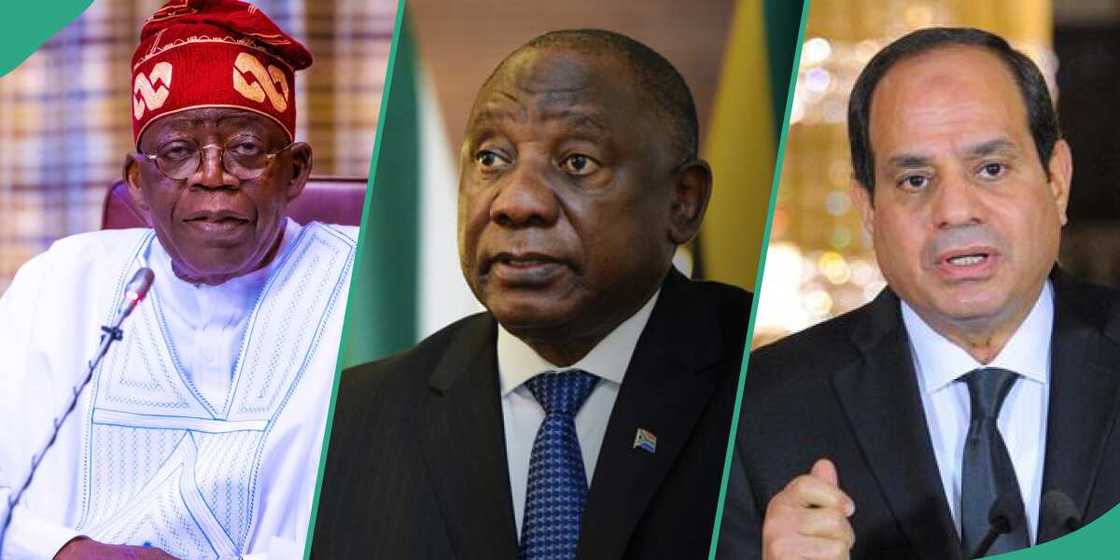Nigeria Set to Lose Position as Largest Economy in Africa to South Africa
- The IMF has stated that South Africa is set to overtake Nigeria as the largest economy in Africa
- It, however, noted that this would not last long as Nigeria would again take its position
- According to the IMF, South Africa's economy will grow 0.9% this year and 1.8% in 2024
PAY ATTENTION: Click “See First” under the “Following” tab to see Legit.ng News on your Facebook News Feed!
The International Monetary Fund, IMF has predicted that South Africa's economy would briefly surpass that of Nigeria and Egypt as the largest on the continent.
According to the IMF's World Economic Outlook, South Africa would have a gross domestic product of $401 billion in 2024, compared to $395 billion for Nigeria and $358 billion for Egypt.

Source: UGC
Nigeria to take back position
The analysis, published recently, predicts that the most industrialised country in Africa would only maintain its top position for a year until Nigeria overtakes it once more and that it will drop to third place behind Egypt in 2026.
Bloomberg economists said:
“We believe the IMF’s projections reflects where it believes meaningful reforms will take place. South Africa’s transient emergence as Africa’s largest economy in 2024 is mainly due to the shrinking of Nigeria and Egypt’s GDP in dollar terms, following sharp currency devaluations.
However, the long-term trajectory shows Nigeria and Egypt regaining their top spots, with the former taking a strong lead. For Nigeria to realise the GDP expansion projected by the IMF, we think oil output must be restored to its potential; insecurity needs tackled; and the bottlenecks in the power sector addressed.”
Policy changes
Since taking office as president of the West African country at the end of May 2023, Bola Tinubu has made several significant policy announcements aimed at restoring the state's finances, including overhauling the foreign exchange system, eliminating pricey petrol subsidies, and taking actions to address dollar shortages and increase tax revenue.

Read also
Brain drain: IMF approves "japa" as catalyst for remittances, foreign investment in Nigeria
Although those actions are initially painful for the most populous country in Africa, Bloomberg reports that they are anticipated to pay off in the long run. According to the IMF, GDP will grow by 3.1% in 2024 instead of 2.9% in 2023.
Due to a foreign exchange crisis, Egypt has depreciated its currency three times since the beginning of 2022, with the pound losing nearly half its value versus the dollar.
President Abdel-Fattah El-Sisi hopes to extend his rule until 2030, and the government just obtained a $3 billion IMF package that calls for a more flexible currency rate. This move won't likely be made until after the elections in December.
IMF reviews planned for March and September have been put on hold because of the delay. Successful evaluations might provide Egypt access to around $700 million in deferred loan tranches, a $1.3 billion resilience fund, and possibly significant Gulf investment.
South Africa's rand, which is free-floating, unlike Egypt's pound and Nigeria's naira, has lost 10% of its value versus the dollar this year.
The IMF projects that South Africa's economy will grow 0.9% this year and 1.8% in 2024, with the potential to grow 2.5% to 3% faster if it fixes its electricity problems, deals with its logistical bottlenecks and implements other reforms.
Legit.ng had reported that the World Bank has allayed fears that Nigeria is in debt distress despite its N87 trillion public debt.
IMF warns Nigeria, others to stay away from Chinese loans, source domestic credit
Legit.ng reported that the International Monetary Fund (IMF) has stated that Nigeria and other sub-Saharan African nations are at a turning point in their relations with China.
As a result, the Fund stated that the Chinese government is starting to lessen its exposure in the region.
According to the IMF, African nations must begin to look into domestic funding for their projects.
Source: Legit.ng




